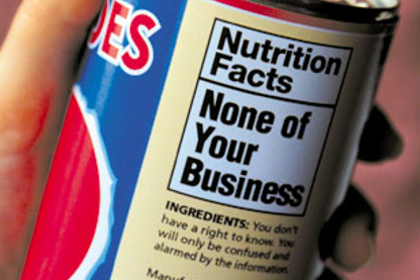
Why We Need GMO Food Labels
November 4, 2015 | Ronnie Cummins
Organic Consumers Association
Health and food safety are hot button issues for millions of Americans. Polls indicate alarm over the contamination of everyday foods by pesticides, antibiotics, hormones, genetically modified organisms (GMOs), and synthetic additives. A New York Times poll found 93% of Americans want GMOs labeled, as required by 64 nations. Two-thirds of Americans believe that GMOs are unsafe. Millions of consumers are switching over to non-GMO, organic foods, moving organics from a niche market into a $40 billion powerhouse. Americans now spend over ten cents of every food dollar for items that are labeled “organic,” “non-GMO”, or “natural.”
A series of highly publicized GMO labeling ballot initiatives in California, Washington, and Oregon have fueled the fires of the “Frankenfoods” controversy, with Big Food and chemical companies spending vast sums to stop labeling. Vermont, Maine, and Connecticut, have passed popular laws requiring labeling of GMOs. Eight counties in California, Washington, Oregon, and Hawaii have banned GMO crops altogether. Vermont’s mandatory GMO labeling law goes into effect in July 2016, causing near-panic among major food brands, who face the dilemma of either removing all GMO ingredients from their products (which is what they did in the EU after GMO food labeling became mandatory in 1998) or else affixing what Monsanto has called a “skull and crossbones” GMO label on the front of their packages and bottles.
Eighty percent of supermarket foods now contain GMOs and the toxic chemicals sprayed on GMOs. In March 2015 the International Agency for Research on Cancer of the World Health Organization declared Monsanto’s Roundup glyphosate herbicide, sprayed heavily on 84% of all GMO crops (including corn, soybeans, canola, sugar beets, cotton, and alfalfa), as well as other crops including wheat, beans, and rice, a “probable carcinogen,” prompting the banning of all GMO cultivation in several dozen nations, including Germany, France, Italy, Netherlands, Austria, Poland, Greece, Hungary, Scotland, Wales, Northern Ireland, Russia, and Denmark. In California authorities announced that Monsanto’s glyphosate would be added to its list of cancer-causing chemicals requiring special monitoring and warning signs. The EPA previously acknowledged that long-term exposure to glyphosate can cause kidney and reproductive damage. And a report by a senior MIT researcher last year connected glyphosate to damage to the human gut and digestive system, as well as hormone disruption, impaired liver detoxification, and lowered nutrient absorption.
Meanwhile, with the rise of GMO-induced superweeds on the majority of U.S. farm land, the EPA, USDA, and FDA have given the green light to a controversial new generation of GMO crops that can be sprayed with 2,4 D (a component of Agent Orange), dicamba, and other highly toxic herbicides. Billions of pounds of glyphosate, atrazine, and 2,4 D, and other toxic pesticides are now being sprayed on our food, accompanied by billions of pounds of highly polluting chemical fertilizers. This GMO/chemical onslaught is destroying our health and contaminating our soils, surface waters, and air. Meanwhile the emissions from GMOs and industrial food and farming have become major factors in global warming.
Americans want GMO labeling. Unfortunately Monsanto, Big Food, and their minions in the US Congress have decided that you, the consumer, have no right to know what’s in your food. In July the U.S. House of Representatives passed a highly unpopular law taking away state and consumers rights to require labels on GMO foods. The law also makes it legal to fraudulently label GMO and chemical tainted foods as “natural.” Now this bill, dubbed the DARK (Deny Americans the Right to Know) Act, goes to the Senate. If you want to stop the DARK Act, please use your cell phone and text LabelGMOs to 97779. Tell Congress you want mandatory labels on GMOs.
Ronnie Cummins is international director of the Organic Consumers Association and its Mexico affiliate, Via Organica.
